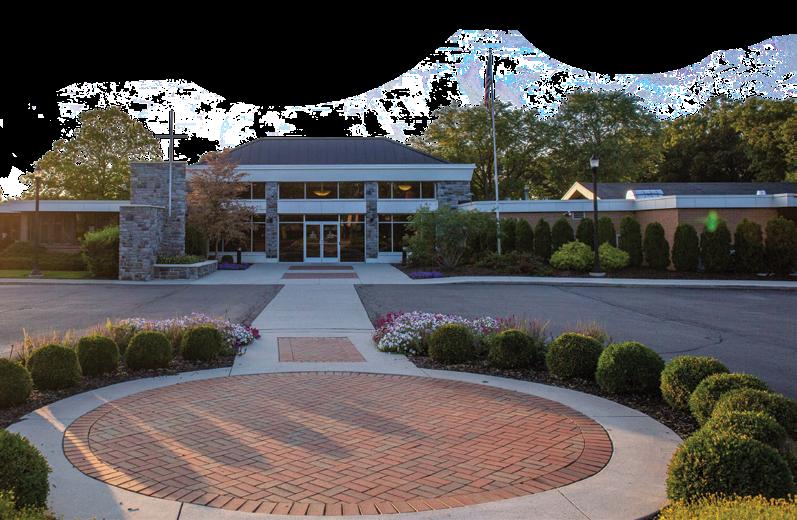HOPE FOR OUR COMMUNITY
MERLY VELASQUEZORTIZ SERVES IN THE GRAND RAPIDS POLICE DEPARTMENT

ALL IN THE FAMILY
GRACE ALUMNAE
MINISTER TO REFUGEES AT BETHANY
CHRISTIAN SERVICES
LEADING WITH SERVICE
BOARD CHAIR
WINS BRILLIANT TEAM
PLAYER AWARD

MERLY VELASQUEZORTIZ SERVES IN THE GRAND RAPIDS POLICE DEPARTMENT

ALL IN THE FAMILY
GRACE ALUMNAE
MINISTER TO REFUGEES AT BETHANY
CHRISTIAN SERVICES
BOARD CHAIR
WINS BRILLIANT TEAM
PLAYER AWARD
E DON’T HAVE TO LOOK FAR TO SEE THE DESPAIR AND ANXIETY IN OUR WORLD TODAY. It’s easy to see obvious setbacks and misery, but there is tender growth, and buds are blooming amid the desolate landscape. Our God is relentless in bringing startling beauty out of prevailing uncertainty and suffering. It takes no effort to notice the setbacks and misery before us, but it requires greater focus to see the amazing stories God is crafting in people to inspire hope. As you turn the pages of this publication, I trust your heart and mind will be moved by the stories of God at work, constantly bringing beauty—if we are but willing to shift our focus from the dominating negativity to see it.
THE JOURNEY | SPRING 2022
President | Dr. Ken Kemper ’85
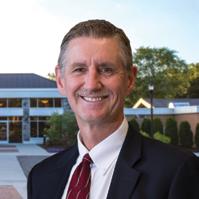
Managing Editor | Emily Gehman
Graphic Design | Tim Peters
Contributing Writers | Kate Klingensmith, Aubrey Kyle ’19, Kevin Mungons
Photography | Darrell Goemaat
Alumni Relations | Ami Walker
UNIVERSITY
By God’s grace and His divine enablement, we will do this despite political or social challenges. These stories reflect how God is using Grace Christian University to impact our community and fulfill our mission in ways we never imagined. The Grace Family is growing and spreading, and its impact is significant in the lives of students, employees, alumni, board members, and ministry partners. It’s a blessing to see how God is working through students and alumni to bestow incredible hope to others. This hope springs from the realization that God is not limited or awaiting a more appropriate time to act, but daily rolls up His proverbial sleeves on His almighty arms to work in and with those who surrender to His leading. Enjoy these stories of hope. Let God restore yours, too.
Hopeful,
Ken Bruce Kemper PresidentAdvancement | Stephen Gowdy ’85
This issue is dedicated to the Creatives, whose work graciously reminds us of the hope, delight, and love of God.
GRACECHRISTIAN.EDU
Merly Velasquez-Ortiz, a student in the Criminal Justice program, works at the Grand Rapids Police Department. With every report she files, conversation she translates, and citizen she helps, Merly infuses hope into our community. Read her story on pages 12–15.
©2022 Grace Christian University
All Rights Reserved
Photo by Darrell GoemaatLEFT
BELOW
Merly Velasquez-Ortiz is the first Grace student to become a cadet at GRPD.
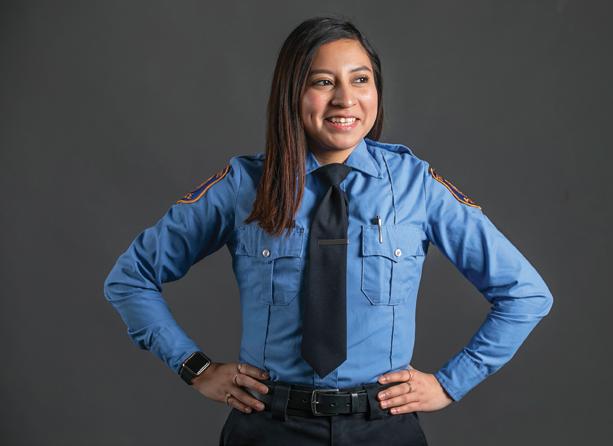
12 18
RIGHT Cody
Daniels shares
IN THE STUDIO
Cody Daniels: Lost & Found
Pastoring in a pandemic left Cody feeling lost.
MEET THE BOARD
20 21
Meet two alumnae working to bring a hope and a future to refugees and families from around the world.

For the first time since 1972, Grace Tigers don the colors and ballcaps—for more than just hits and runs.
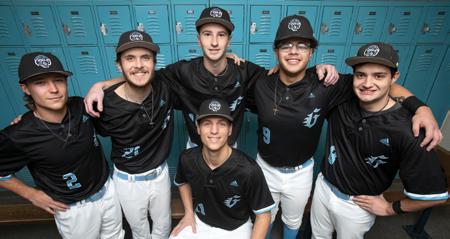
Merly Velasquez-Ortiz breathes hope into our city by meeting the practical needs of a cross-cultural community.

Here’s where we’ve been, how we’re doing, and where we’re going.
Our 2021 Alumni Award Recipients and the Class of 2021!
Dr. Gretchen Johnson: Serving in Society
Grace’s first female board chair is also West Michigan Woman magazine’s Brilliant Team Player.
Rebekah Shyne: Starting Conversations
graduated together in 2021, and landed jobs at Bethany Christian Services in Grand Rapids. And though their work with foster children and teen refugees creates high-stress challenges, they are still good friends who finish each other’s sentences.
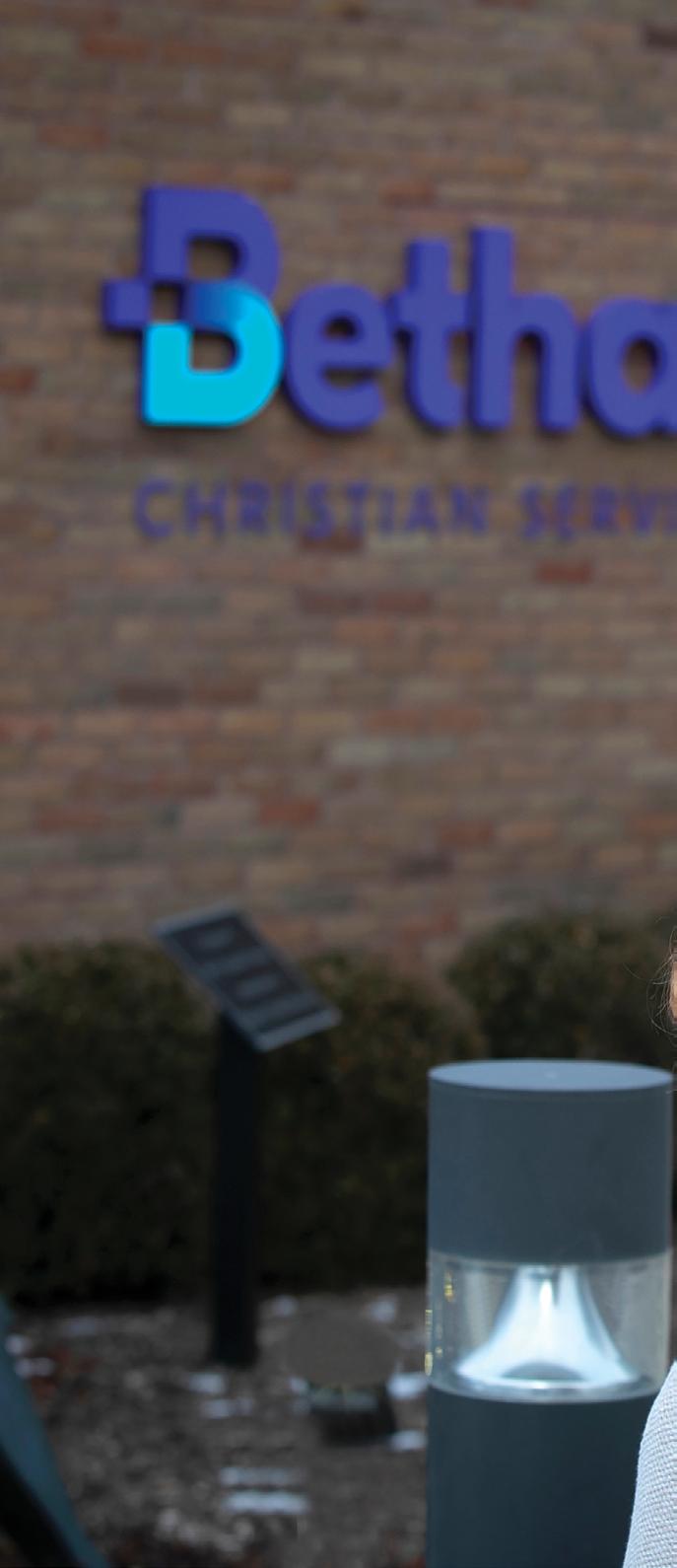
“When you’re dealing with teens,” Mallory says, “first of all, teens of your own are difficult enough, but dealing with teens that have—”
“Severe trauma,” Cassie interjects— “Can be really, really difficult.”

“It’s ministry work,” Cassie finishes.
And the short path from graduation to the world of at-risk teens
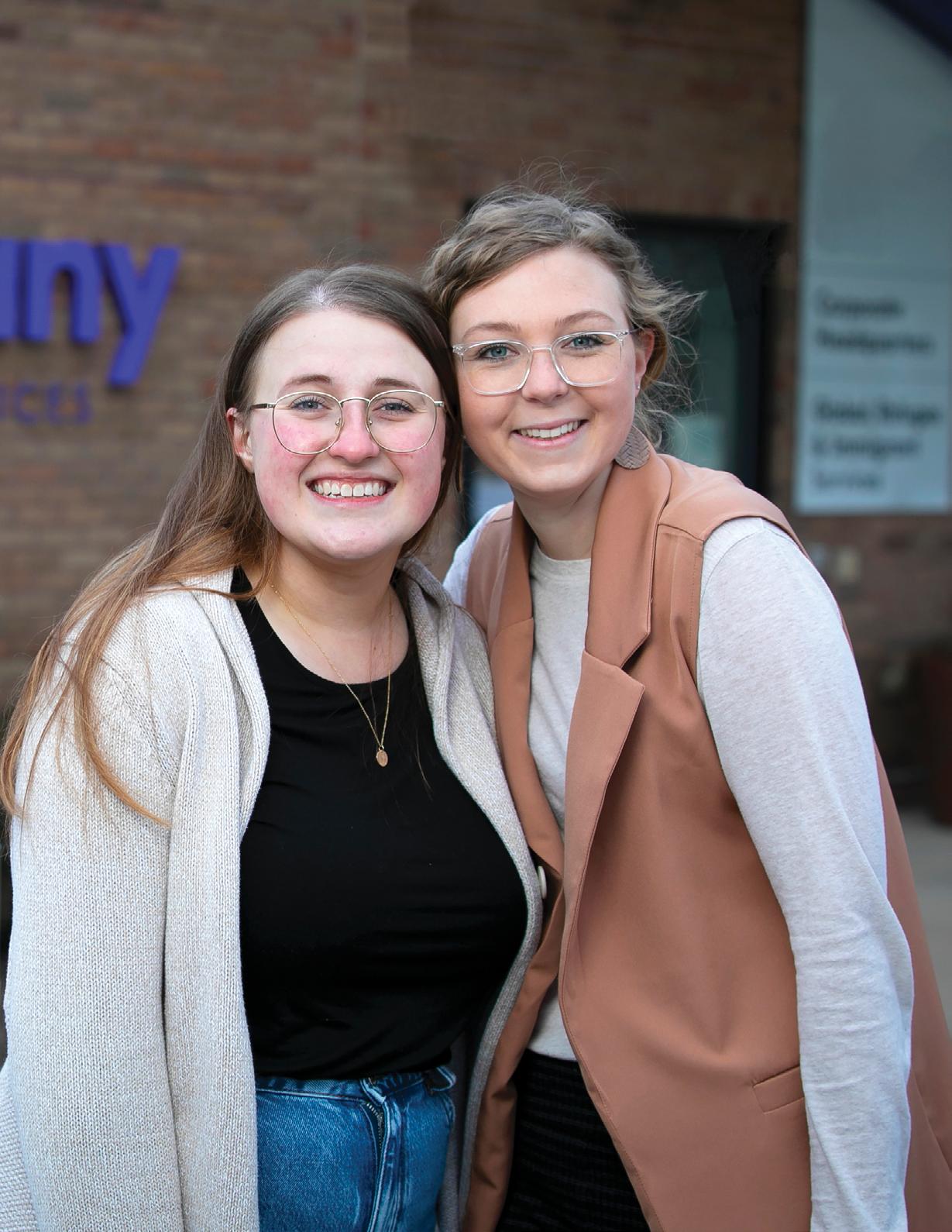
In her role as a refugee foster care case manager, Mallory works with some of the world’s most vulnerable teens. “Sometimes they’re fleeing from a national crisis, sometimes their family didn’t have the resources to take care of them. But a lot of times they’re coming here because a biological family member was abusive to them,” Mallory says.
The government calls them Unaccompanied Refugee Minors. Her clients, ages 13-21, arrive from Central America, South America, Africa, and a growing number from the Middle East.
“Some of them don’t know if their parents or siblings are alive,” Mallory says. “And they’re 16 years old, so they can’t function on their own.”
Somehow Grand Rapids became an unlikely hub for refugee services. In the past decade, Michigan has ranked in the top five states for refugees. BCS’ well-regarded program has
attracted more refugees and, in turn, created more needs.
“They need a place to live—they need to be protected . . . they need a family,” Mallory says. “They need counseling services a lot of times, and they need an advocate for them. So my job is to make sure they’re safe, secure, and that they’re doing well.”
REFUGEE MINORS have fled their country of origin, seeking safety at a refugee camp. Instead, they often find dangerous conditions, minimal services to children, inadequate food rations—and the vulnerability of human trafficking. Most will never see their family again.
A foster care case manager, Cassie offers safety and support to children who have been removed from their home for any number of difficult reasons, usually involving the parent. She sees the effect of family trauma every day.
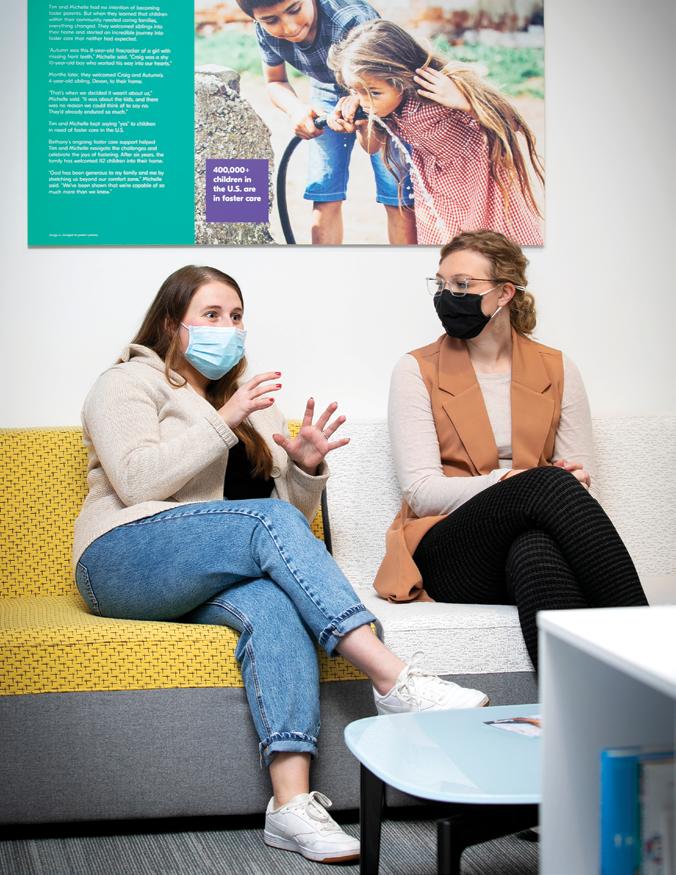
“If you’re not addressing your trauma, you’re going to be very angry, you’re going to have behavioral outbursts, and depending on your trauma, you might have sexualized behaviors,” she says. “A lot of our teens, especially the ones who have sexualized behaviors, have placement breaks all the time,” explaining how troubled teens bounce around the foster care system.
“Ultimately, we want to establish permanency for our kids as fast as possible,” she says.
When all goes well, families reunite. The next best solution, according to Cassie, is to place the children with other family members. “Studies have shown that kids go home sooner if they’re with their family,” she says. On the day we talked, she had testified in Family Court, reporting on two cases. “I testify to what the parents are doing, what they haven’t been doing, and whether they need more time.” But that can lead to the toughest part of her job, when she’s forced to recommend a termination of parental rights.
It feels like a heavy task for someone straight out of college.
Cassie majored in Human Services, interned at BCS during her senior year, and landed a fulltime job even before graduating. If her career path seems textbookperfect, Mallory’s was less direct.
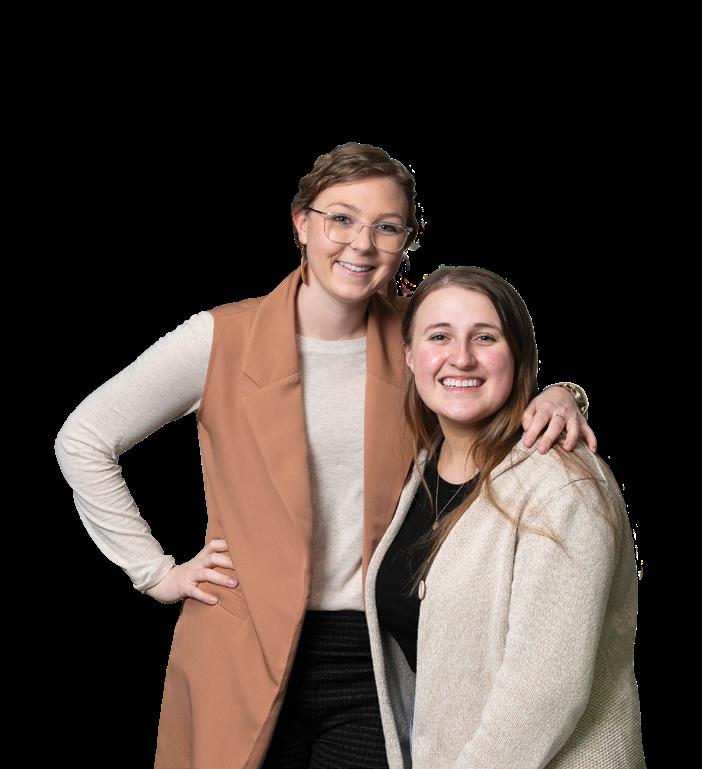
“I switched my degree way too many times—that’s a little embarrassing,” Mallory says as Cassie laughs, anticipating a familiar story.
Mallory launches into a meandering explanation about changing her major several times before settling on Psychology, once living in Africa, then in Nicaragua for three months. She returned home hoping for a job to use her Spanish skills—then she saw the BCS job posted online.
“I thought I was applying for Cassie’s job, but I applied on accident to work with refugees,” Mallory says. The wrong job. Worse still, BCS called for an interview, leading to Mallory’s panicked visit to Dr. Scott Shaw, dean of the School of Social Sciences and Human Services.
“I feel enormously underqualified for this job,” she told him. “Do you think I can do this?”

“Take it,” Shaw said. “You can definitely do this!”
Looking back, Mallory sees the thread that holds her story together: “My heart for people of different cultures is a big passion of mine.”
“Grace is really good at teaching cultures—and the important differences in cultures and views,” Cassie says, crediting the professors who influenced her, such as Dr. Pamela Sherstad and Professor Dawn Rodgers-DeFouw. Mallory jumps in to add Dr. Dave Greydanus, Dr. Scott Shaw, and Professor Sherita Jahaziel.
“I feel like it’s a small community,” Cassie says, “so your professors know you well, and they really want you to succeed.”
“We experience so much secondary trauma in this job,” Cassie says. “If you’re staying over two years, you’re pretty much a
Cassie’s first advice to Mallory was to set boundaries. Go home, have your own life, leave work at work. Otherwise, “you work with so many people, you just worry about them all the time.”
And cherish the best parts of the job—the “ministry work” that started it all.
“I love airport arrivals for families or kids,” Mallory says, describing how she welcomes refugees to the US. “You take them to a hotel, and you teach them how to turn on the heat, and where to turn on the faucet, and how to turn on the stove. That’s my most rewarding part of the job.”
Cassie recently finished a twoyear case where foster children returned home, reunited with their family. “I got to have that call with a mom—‘My case just closed!’” Cassie says. “Those are the good moments.” ■
GRACE IS REALLY GOOD AT TEACHING CULTURES—AND THE IMPORTANT DIFFERENCES IN CULTURES AND VIEWS.
T GRACE, WE’RE COMMITTED TO GRADUATING GODLY INDIVIDUALS PREPARED TO SERVE CHRIST IN CHURCH AND SOCIETY. That means we’re constantly expanding with new programs for students to build both skills and character for serving wherever God plants them.
Across all Grace programs, both on campus and online, students are prepared with a biblical foundation, critical thinking skills, and hands-on experience so they are ready for careers in their fields of study. Grace offers undergraduate degrees in Biblical Studies, Business, Criminal Justice, Global Communication, Human Services, Interdisciplinary Studies, Leadership and Ministry, and Psychology, as well as graduate degrees in Ministry and Organizational Leadership.
New in the 2021-2022 catalog is an Associate of Arts in Social Science, a Bachelor of Music in Music, Worship, and Technology, a wide range of undergraduate minors, a Master of Arts in Higher Education Leadership, and a Master of Business Administration
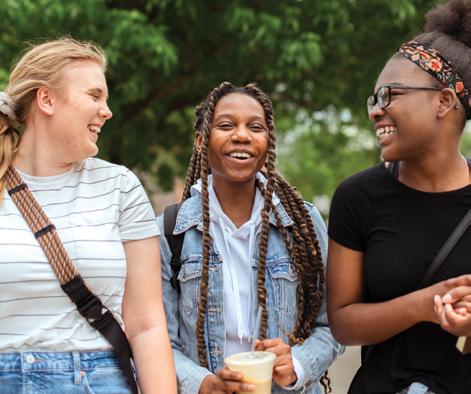
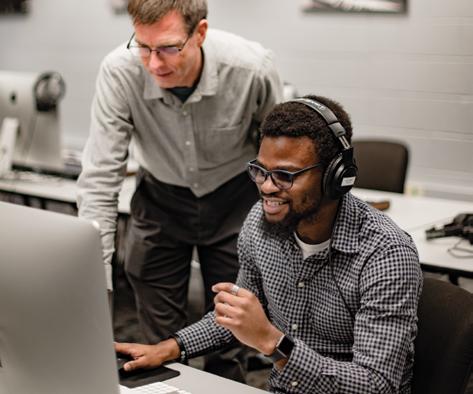
Students may now declare a minor to focus and deepen their study alongside their chosen program. Minors require a minimum of 15 credits and are designed specifically to enhance and enrich students’ university experience.
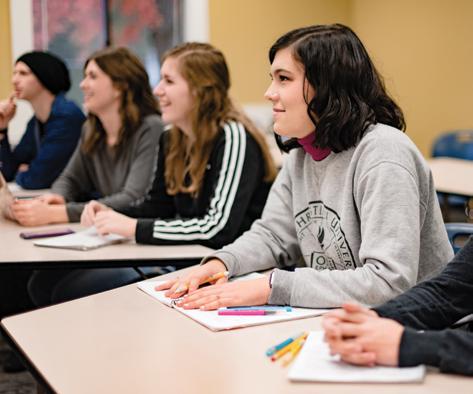

• Adult Development and Aging
• Biblical Languages
• Business
• Criminal Justice
• Global Communication
• History
• Human Services
• Leadership Studies
• Music
• Pastoral Ministry
• Psychology
• Technology
• Urban Studies
• Worship
• Writing and Literature
• Youth Ministry
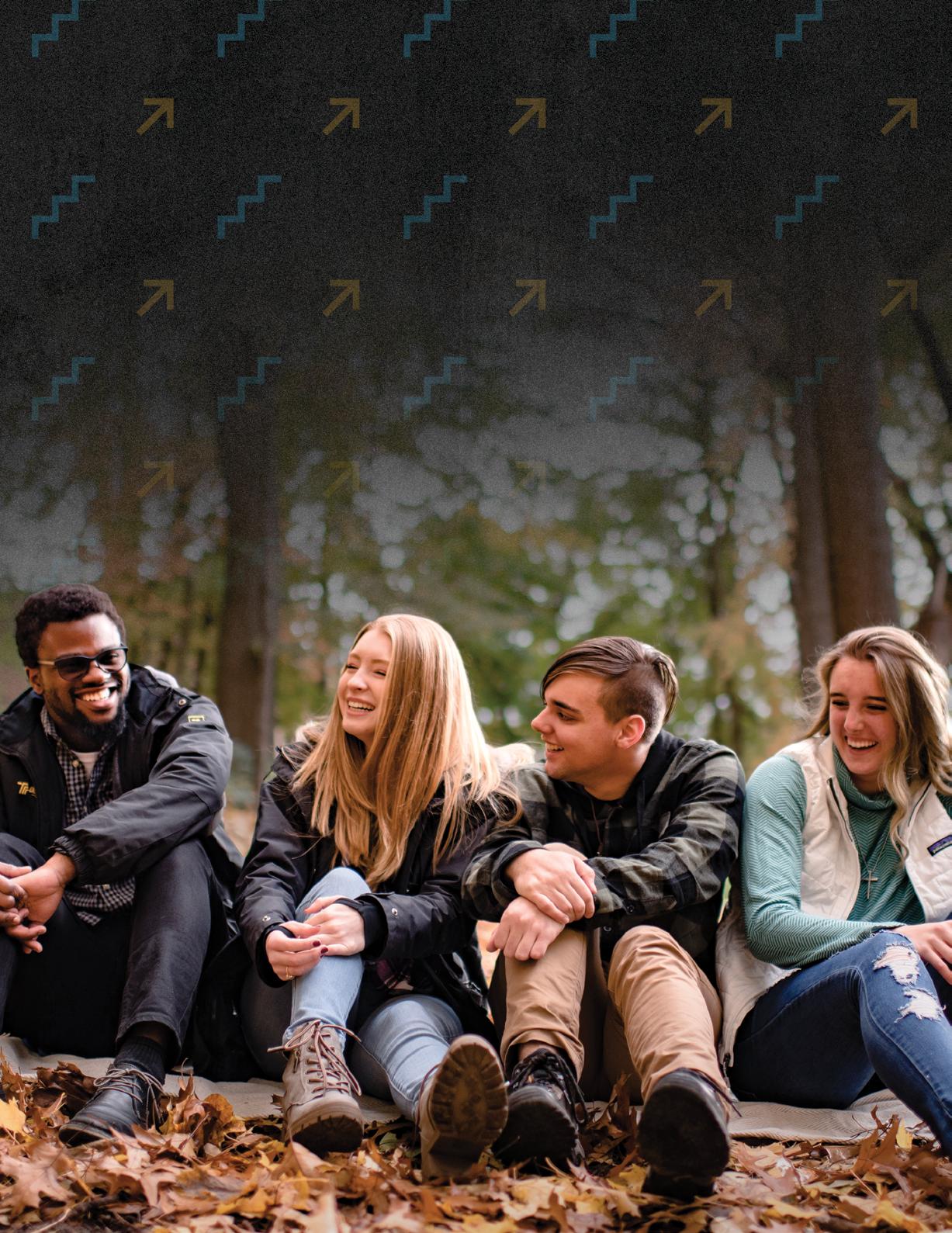

Abaseball players as they scrimmaged teams around the region. The 11-man roster and a few photos live on in the 1972 Grace Bible College yearbook, but the memories of baseball alumni like Charley Young ’75 hold fast.
“It was a blast,” Charley says. “It helped me integrate my faith into everyday life and gave me a platform to share my faith.”
Charley went on to become a lifelong pastor.
The schedule and the coach—and of course, the players—are different, but the mission of Grace Christian University baseball is the same as it was fifty years ago. They continue to focus on more than just the game.
“Our team will bring glory to God through our integrity, work ethic, discipline, and servant hearts,” says head coach, Colton Wolfe.
In September, when fall exhibition games began, Coach Wolfe told Grace becoming the
back to Michigan. In 2020, he joined the online enrollment team at Grace Christian University, and in the spring of 2021, he accepted the head coach role. Assistant coaches Kyle Peets and Jamie Bristol aid Coach Wolfe.
"To have the opportunity to start from scratch and create a foundation for the years to come is truly an honor,” Coach Wolfe says.
Coach Wolfe’s excitement and vision for the future of Grace baseball has spread to his inaugural baseball team. Jared Garnaat, a midfielder from Lowell, Michigan, is a freshman in the communications program.

“A big goal I have is setting an example for the guys that will be joining our program in the future,” Jared says. “Being a part of the first team gives us all the opportunity to set the course of this program.
One of the team’s captains, Kelan Knoll,
a freshman from Grand Rapids, appreciates the entire Grace Christian University community.
“It’s very important to have people supporting you in doing what you love.”
The Tigers’ 40-game schedule holds games in Georgia, Kentucky, Indiana, Illinois, and Ohio to play teams in the National Christian College Athletic Association and the National Association of Intercollegiate Athletics. Home games are played at Lamar Park in Wyoming, Michigan, just two miles away from campus. The Tigers’ home opener is March 30 at 2:00 p.m. Coach Wolfe looks forward to the community atmosphere the baseball season will bring to Grace Christian University.
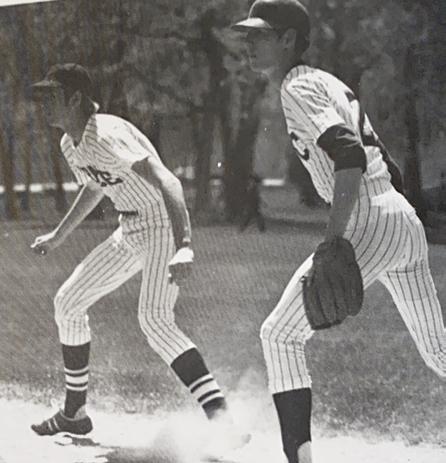
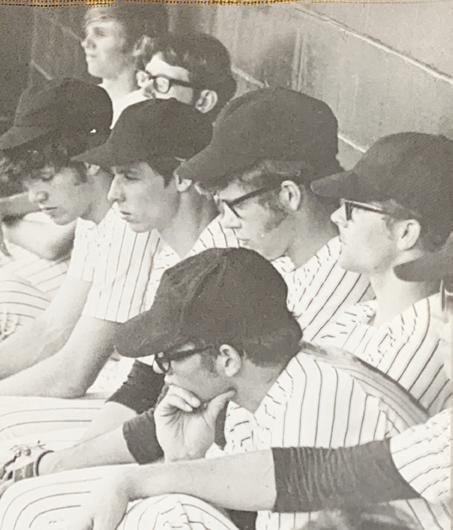
“I think it will bring more than just a fun place to go on a Friday afternoon,” Coach Wolfe says. “It will bring another aspect for the student body to feel proud of their institution and peers.”
Baseball is back and here to stay. Come support your Grace Christian University Tigers! ■
ALLEN DURHAM
AT GRACE: Three-time National Champion, Threetime All-American, 2011 Pete Maravich Award


Recipient, All-Time leader in Points and Rebounds, Hall of Fame Class of 2018

NOW: Ryukyu Golden Kings in Okinawa, Japan
AT GRACE: 2016 Regional Player of the Year, 2013 and 2016 All-American, Four-time All-Region, All-Time Assists Leader (33)
NOW: Head Coach of Women’s Arena Soccer, Muskegon Risers in Muskegon, Michigan


AT GRACE: 2018 National Champion, 2019 Team MVP, 2019 All-American, 2018 and 2019 All-Region
NOW: Great Lakes Wanderers Arena Soccer in Grand Rapids
AT GRACE: 2019 National Champion and starter for 2020 First Place NCCAA finishing team (the tournament was canceled due to COVID-19), 2020 All-Region Honorable Mention
NOW: FIMA 94 Elite in Yerevan, Armenia
 BY EMILY GEHMAN
BY EMILY GEHMAN
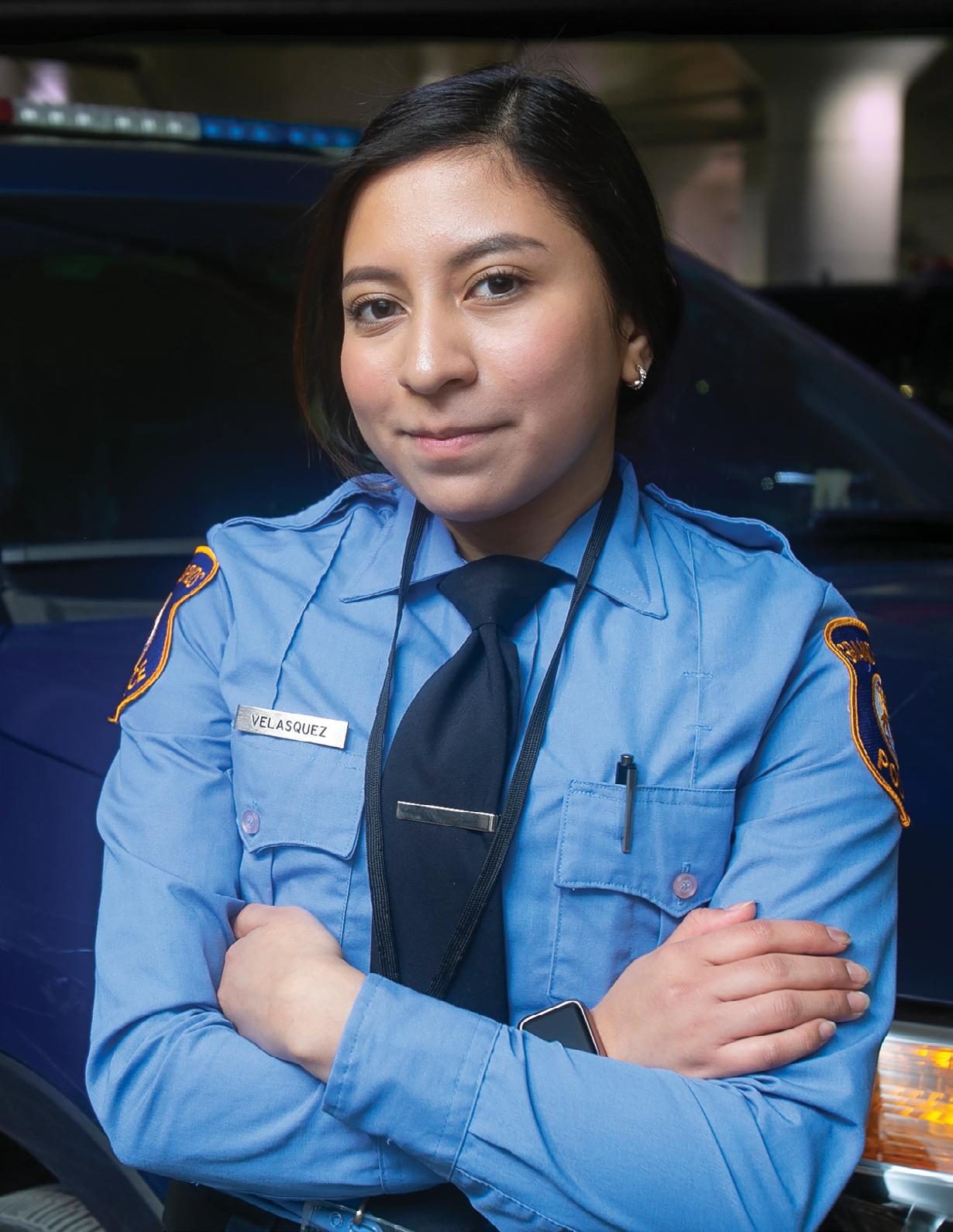
THEY TOLD ME TO ASK IF IT WAS AN OPEN FIST OR A CLOSED FIST, and ‘Was it his left hand or his right hand?’” Merly VelasquezOrtiz ’23 says. “I would have never thought to ask those questions.”
At work, Merly sits behind bulletproof glass, wearing a shirt and a tie over her bulletproof vest. Prior to her internship at the Grand Rapids Police Department, she had never even spoken to a victim of domestic violence. Now, she answers the non-emergency line and greets visitors to the imposing downtown building at the corner of Monroe Center and Division.
At all times, the screen in front of her shows all of the Grand Rapids 911 calls in real time, emergencies and tragedies in a constant stream of hopelessness.
“I’m seeing everything bad that has happened. So many things,” Merly says. “It can be overwhelming sometimes. I always want to fix things, but sometimes I just can’t.”
When Merly graduated from high school in 2019, she had no idea what
“Everyone knew what they wanted to do, and I was not sure at all,” Merly says. “I was confused, and I was on edge about everything, and I was going through this alone. It was just kind of a dark moment.”
But a friend and mentor from her church had attended Word of Life Bible Institute in Pottersville, New York and suggested Merly look into it.
So she did, and
although she was only there for a few months before COVID-19 sent everyone home, she says those months were spiritually pivotal.
“I wasn’t living my faith, I was kind of just following my parents,” Merly says.
“At Word of Life, I learned to have a relationship with God.”
Though she wasn’t sure what was next, Merly decided not to return to WOLBI for the next school year. She’d visited Grace Christian University while she was still in high school—with two friends who were more interested in a day off school than attending a Christian university—and remembered enjoying a worship chapel and talking with professors.
She applied, was accepted, and she was interested in—but still not sure about—criminal justice.
“A year ago, my thoughts about the police were not what they are now,” Merly says. “I am a minority; I am a person of color . . . with everything going on in the media, I was really not sure.”
Merly’s family is originally from Guatemala, and they’re part of Grand Rapids’ growing Hispanic community. She didn’t know what to think about the racial tensions and cultural issues surrounding law enforcement and minorities. But still, criminal justice seemed to be calling.
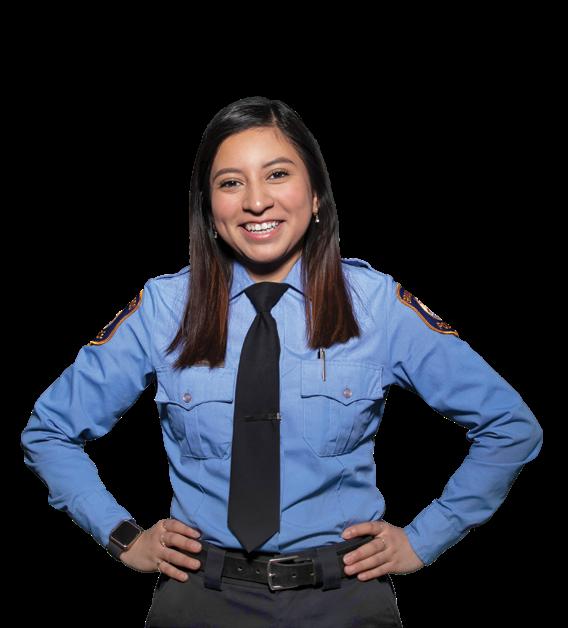
She joined Grace’s criminal justice program, and when Dr. Dave Greydanus, department chair, told her about the GRPD internship, she still wasn’t sure. But she applied. She went through the background check and rigorous interviews—“they were pretty intimidating”—and with four months of training and a new bulletproof vest, Merly sat behind that bulletproof glass.
While law enforcement has been criticized in the cultural pressure cooker— Merly’s even answered angry callers who have dialed just to say rude things—she
sees officers with new eyes.
“They work 12-hour shifts. I know they’re exhausted,” Merly says. “You see them and you have compassion for them; you realize that they’re going through a lot, too.”
Merly’s still not sure about everything— who is? But she’s more sure than she was two years ago. She’s sure she has a relationship with God. She’s sure she’s meant to be in criminal justice. And she’s sure about one more thing:
“I need God in everything at my work.”
The GRPD interns handle all kinds of non-emergency needs: answering the non-emergency phone line, filing traffic incident and theft reports, registering sex offenders and impound lot entries, and tending to walk-in requests.
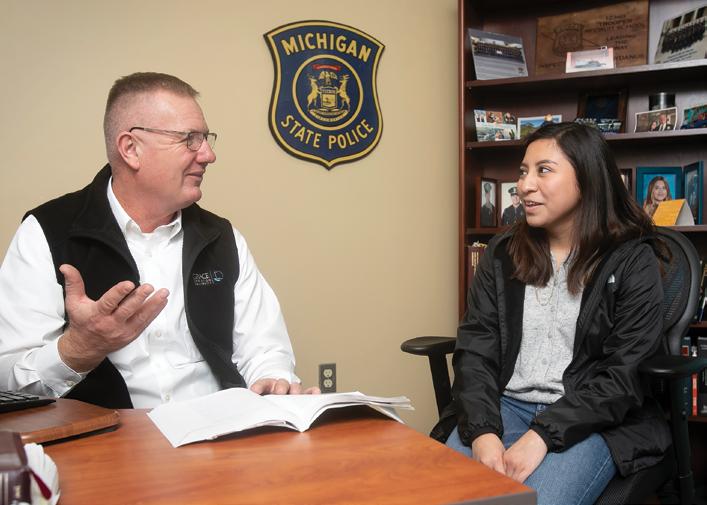
And in a city the size of Grand Rapids, that could mean anything. She never knows what a shift will bring.
One day she learned to ask the right questions of domestic abuse victims and photograph the bruises while taking the violence report.
On Christmas Day, nearly all the calls were about domestic violence.
Another day, it was a rape victim.
“She was about my age,” Merly says. “And it was very overwhelming . . . seeing her break down. It was really hard— really sad.”
Another day she translated—Merly is bilingual—for a detective when a shooting victim came in.
“I’ve been given a lot of cool opportunities because I speak Spanish,” Merly says. “It’s so cool to be able to help them, because at the end they are grateful, because they got the answers they needed . . . it’s very rewarding.”
For many individuals and families, seeking help from law enforcement is a
last resort. They’re not calling because they’re having a good day. They’re calling because they need something tangible— an officer’s helping hand, a report filed, a translator.
“Where I show hope is toward the Hispanic community,” Merly says. “ . . . We need more people of color in law enforcement.”
When they call or come into the station and struggle to communicate, Merly is at the ready.
“Then they see me, and the look on their face is that they’re hopeful and happy that I’m here.”

But they need something intangible, too: hope. And Merly can give it to them. She meets these needs and serves the community because she knows a greater hope.
“My story is living proof of who God is,” Merly says. “ . . . I know this is not all of life. We have something more to look forward to. And one day, there’s not going to be any of this.” ■
DR. DAVE GREYDANUS AND MERLY DISCUSS HER FUTURE IN LAW ENFORCEMENT.I DIDN’T KNOW THIS SMALL COLLEGE IN WYOMING COULD DO SO MUCH FOR ME.
IT’S ALWAYS EXCITING TO DREAM BIG AND ANTICIPATE WHAT’S AHEAD! But it’s important to pause and look back in gratitude for God’s provision.
“We praise the Lord for the incredible generosity for the Expanding Grace Capital Campaign. Our gracious financial partners helped us finish this three-year campaign and exceed our goal. Students are already enjoying the upgraded kitchen, expanded and remodeled dining room, new technology, and valuable scholarships. They’re watching with anticipation the largest student housing project to date being added to our campus.”
 — Stephen Gowdy ’85
— Stephen Gowdy ’85
We’re excited to celebrate God’s faithfulness in many ways so we can continue to graduate godly individuals prepared to serve Christ in church and society.
“As we look toward the future, we’re so blessed to see the start of long-term endowed scholarships which are critical for the future funding for our students in a chaotic world. This is very exciting, and it will be a major emphasis in the years to come.”

We exceeded our three-year capital campaign goal of $4 million by $700 thousand! Campus upgrades include an expanded and remodeled dining room and kitchen, technology updates, down payment on a new 116-bed student residence hall, and most importantly, annual scholarships. Gifts and donations total more than $4.7 million. Thank you for giving to Grace.
— President Ken Kemper ’85Let’s keep dreaming and trusting God together! ■ $ 4 7. MILLIONRAISED↑
$4 MILLION GOAL
Learn more at GRACECHRISTIAN.EDU/EXPANDING-GRACE
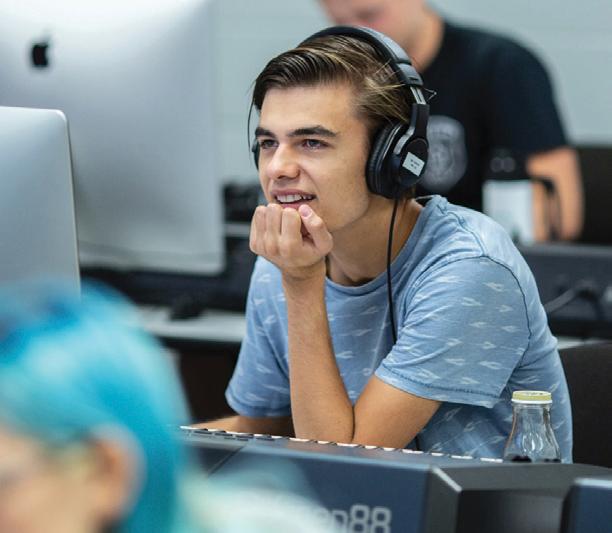
Year-end giving in 2021 brought an outpouring of gifts of more than $400,000 to fund current students’ scholarships. To meet our Grace Fund goal of $900,000 by June 30, 2022, we need just under $300,000. Please pray with us for God’s supply.
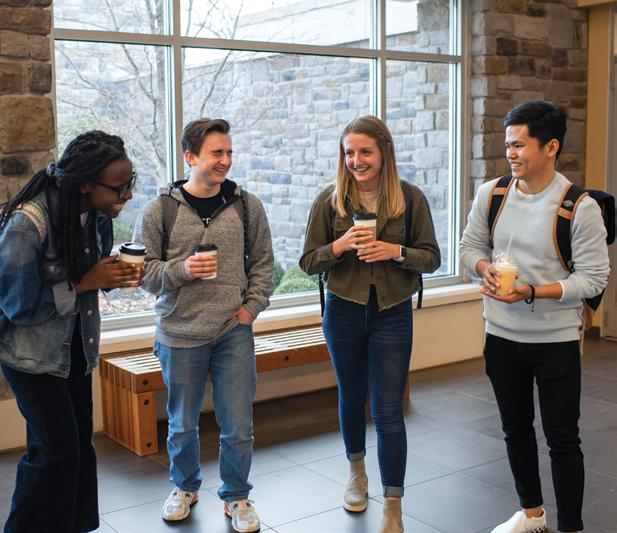
4 SCHOLARSHIPS NEW
We praise God for being able to add four new long-term student scholarships through gifts totaling $240,000. This is an encouraging beginning to the future vision of familyendowed scholarships.
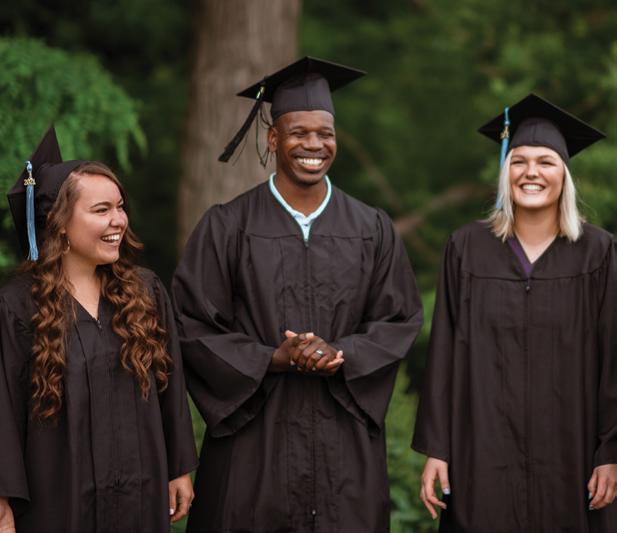
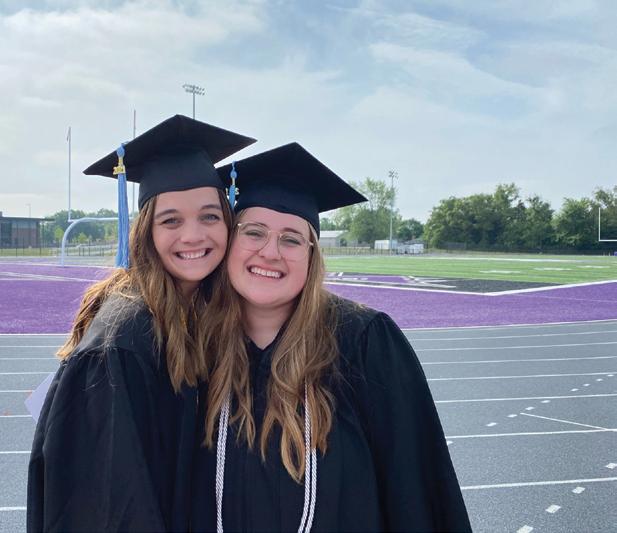
GRACE FUND $900,000 ANNUAL GOAL INVESTED $240,000 IN LONG TERM SCHOLARSHIPS
$300,000 NEEDED BY JUNE 30
Give today at GRACECHRISTIAN.EDU/GIVING

Not geographically; he lived in Cambridge, Ohio—where he knew the back roads from his career in pizza delivery.
Not spiritually; Cody had been a Christian since he was young.
But being a worship pastor in a pandemic made him question everything. He felt lost.
“I told God, I’m an open book. You can write whatever You want on it.”
Having pastors for parents, Cody felt an early pull to ministry. He shared the gospel with his high school classmates, and when he graduated, he went to a local Christian university and majored in intercultural studies. But soon, he felt it wasn’t the place for him.
“I noticed a lack of spiritual energy in the school,” Cody says. “It was just really discouraging.”
He didn’t finish the school year. That summer he counseled and led worship at Joy of Living Camp in Brinkhaven, Ohio, where he sensed God’s call to ministry. Then the actual phone rang. It was a longtime friend, a pastor at Cambridge Nazarene Church, asking him to lead worship.

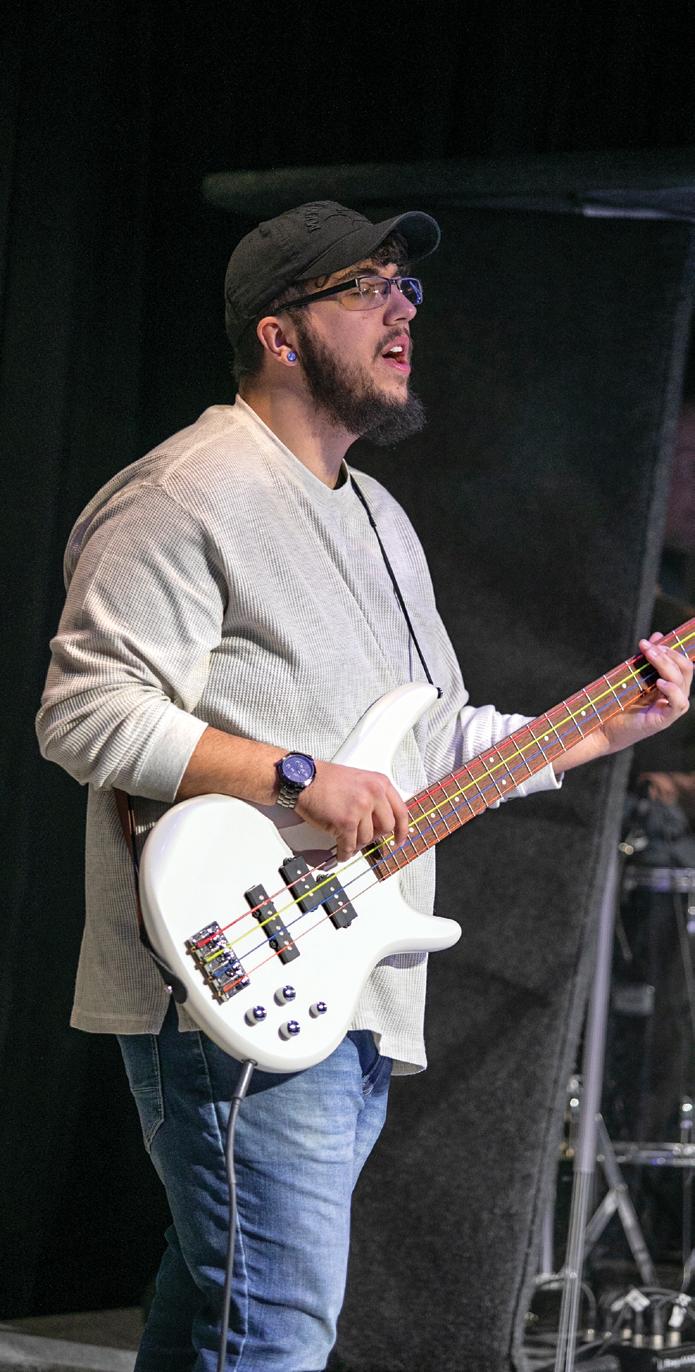
Eager to begin ministry, Cody accepted, unaware of the discouragement ahead.
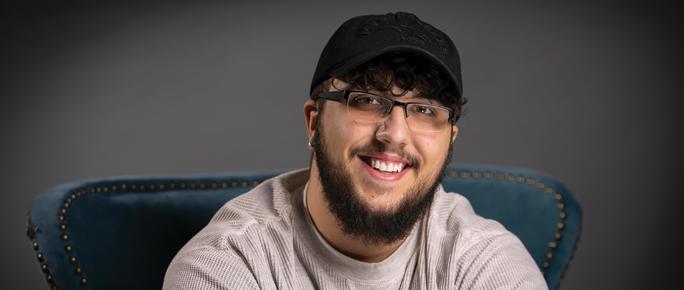
“I felt so alone,” Cody says. “There were nights when I went home and cried, and there were nights when I went home and I was mad.” His excitement for innovative ministry was met with quarantines and canceled events. Nothing happened. Nobody was around. And he felt a deep loneliness and dejection.
“I questioned God: Why would You send me here? Why would You do this?” As Cody wrestled with doubt and despair, he realized it only affirmed his passion for ministry. “I saw through every single one of those moments that there was four times—no, ten times—as many moments where I was just so happy to be in ministry.”
That year showed Cody his strengths, but also what was missing. “For me to continue in my ministry, I needed education. I needed guidance.”
Searching first on Google, Cody saw an ad for Grace Christian University. He clicked, and soon Dr. Jason Werkema called and offered a virtual tour.
“I could see God’s presence coming out of him,” Cody says. “And I’ve noticed that from so many people here . . . It’s a small college, but they put so much time into the students.”

“Cody has a heart to lead others in worship,” Dr. Werkema says. “His love for the Lord is genuine, and he is growing in his knowledge and understanding of God’s Word. These characteristics are vital for anyone seeking to serve others as a worship leader. Cody is the real deal and we are very grateful he chose Grace to pursue his education.”
“I’ve enjoyed every second. I wake up excited to go to my classes, to get into the Bible,” Cody says. “I get to become closer to God in those moments . . . and it prepares me for being a pastor.”
Cody’s passionate about leading worship and pastoring, but he’s not sure what’s next. Maybe writing, recording, and producing his own music. Maybe giving lessons. Anything that keeps him in music. But he knows that wherever God leads, he won’t be lost. Just ask him; he’ll answer:
“My name is Cody Daniels, and I am found in Christ.” ■
WHEN STUDENTS COME TO UNDERSTAND THAT THEY THEMSELVES WERE DESIGNED FOR A HIGHER CALLING, THEIR CREATIVE WORK BECOMES A DRIVING FORCE FOR THE ULTIMATE GOAL OF WORSHIPING THE CREATOR GOD. CONSEQUENTLY, THE DEEPER STUDENTS DIVE INTO THEIR STUDIES, THE DEEPER THEY SEEK TO WORSHIP GOD.
DR. JASON WERKEMA, Dean of the School of Music, Worship, and Technology
EVERY SINGLE CLASS REVOLVES AROUND GOD, AND IT PREPARES ME FOR BEING A PASTOR IN THE FUTURE.
Gretchen Johnson ’01 says, explaining how she graduated with a Human Services degree “and I thought my trajectory was into social work.”
But her job at Pine Rest Christian Mental Health Services drew her into “the healing ministry of Christ,” leading to nursing degrees and a doctorate. Now she serves as Chief Nurse Executive—says she loves it— though she calls the past two years the most challenging of her career.
The source of her stress comes as no surprise. When the pandemic hit, most facilities refused to treat psychiatric patients with COVID-19 symptoms. Pine Rest took the opposite approach, hiring more nurses and opening a full COVID-19 unit. Despite the abundant challenges, “I’m still excited to come in every day,” she says. “I love what we do—advocating for those with mental health conditions, making sure that they’re getting good care.”
“I couldn’t be in this kind of job without my family to support me. It can be very demanding, it can be emotionally taxing, it can be stressful. So they’re one hundred percent behind me.”
Along with her husband and daughter, she is active in the ministry of Frontline Bible Church
in Byron Center, where her father, John Records ’73, also attends and where her grandfather, David H. Records ’46, formerly served as pastor. Her Grace roots run deep—her grandfather was an early graduate of Milwaukee Bible Institute. And both preceded her on Grace’s board of directors. Given the family story, she downplays her appointment as the first female board chair.
“It was about having the right person in that role, at the right time, for the work that we need to do,”
she says. “We have a very engaged board. I’m really proud to serve alongside of my board colleagues.”
And yes, the board’s biggest challenge has been COVID-19, again no surprise. Other hot issues include gender identity, sexual orientation, and “anything where you’re countercultural and standing for biblical truth,” she says.
For Gretchen, it all comes back to mission—“‘graduating godly individuals prepared to serve in church and society.’ And to me, that emphasis on society is huge. If everybody is serving inside church, how are we reaching others?” she asks.
Her reputation for community service was recognized last fall with the Brilliant Team Player award from the West Michigan Woman, an organization of influencers and business professionals.
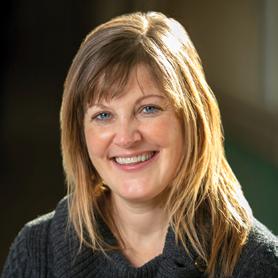
“Because of where I am and how I serve my community, that part is just so important to me— those careers that are outside of the ministry.”
Which leads to the question that could be asked of any Grace graduate: Are you still in the ministry?
“Yes, because that’s my life!”
DREAMED about an innovative walk-in center for mental health care, serving middle school students. A few years ago, she thought her proposal was going nowhere, but then came COVID-19 and a new awareness of student needs.
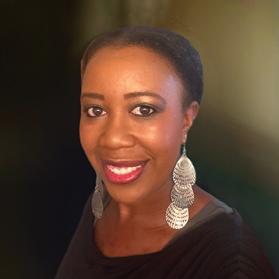
A friend contacted Rebekah and told her about a new freshman program to help with emotional wellness. Would she be interested?
“And I was like, ‘Oh, for sure I would!’” Rebekah says. And because the school hadn’t developed a formal description, she could start by designing the program, which started in August 2021.
Looking back now, she understands how her experience led to this moment. After graduating from Hope College in 2006, she taught in Honduras for two years and developed a passion for mental health care. Returning to Michigan, she continued teaching and earned a master’s degree in Clinical Mental Health Counseling. When COVID-19 hit, she knew that mental health was going to be crucial.
After receiving several grants, Rebekah created a room with carpet, nice furniture, and even snacks to help build connections
with the students. “The money that people are using to support, that’s really exciting and that can only be God. And even just a vision for the program itself is definitely a God thing.”
Rebekah’s day is filled with preparations, sessions, and walkins. Walk-in students can pick up a free snack or hygiene items, then sit down for a while, or even play a game with a life lesson attached. Sometimes Rebekah just invites the students to talk with each other, since that’s a skill that they’ve lost now with COVID-19. Even just playing Uno together helps students make connections with their peers.
“One thing I really think that they appreciate is having someone to listen.” Rebekah says. “One of the questions on the intake form is ‘Why are you coming to see me?’ And they’re just like, ‘I just need someone to talk to.’”
Acknowledging the limits of bringing faith into the classroom, Rebekah shows her students God’s love in action by being the hands and feet of Jesus. “I know that Jesus calls us to be there for people, to walk alongside them in their troubles, and this gives me that opportunity,” she says. “I have a prayer plant that’s in the classroom, so when I’m watering them or when I’m thinking about my students,
I take them to God. Nobody can stop you from doing that part.”
Rebekah finds the same opportunities as she serves on Grace’s board of directors, “checking in on the pulse of the university,” as she puts it.
“I will often ask about the overall feel or vibe of the university to see how students are doing mentally and emotionally,” she says, and during COVID-19 found herself asking the same questions of fellow board members. “And I believe that it is important for the faculty and staff’s mental health to be supported as well. I believe my role is to help start those conversations.” ■
JESUS CALLS US TO BE THERE FOR PEOPLE, TO WALK ALONGSIDE THEM IN THEIR TROUBLES.
Kyle Vegh
Assistant Professor Kyle Vegh ’15 says he loves his role as a “small piece of that growth mechanism which is Grace Christian University.”

But in addition to seeing students grow, Kyle sees immense growth in himself socially, personally, and spiritually.
“[I’m] able to be a better spouse, be a better worker, be a better family member, be a better friend because of that growth I’ve experienced through my time at Grace.”
Kyle earned an MA from Grand Rapids Theological Seminary in 2017. He teaches Biblical Interpretation, as well as theology and Greek courses.
Jim Molenkamp

Jim Molenkamp spent the ’75–’76 school year at Grace playing basketball and building lifelong friendships before transferring to Michigan State University for a business degree. But he never really left Grace. Jim worked as a recruiter, dorm supervisor, business manager, and even taught business courses under three Grace presidents.
Jim married Kathy Kemper after touring with the Grace Singers. And he worked at Grace Ministries International for 23 years as the business manager before retiring in 2019.
“People mentored me,” Jim says. “I just really appreciated them and I looked up to them.”
Kathy Molenkamp
Kathy (Kemper) Molenkamp ’83 earned a BRE from Grace and a bachelor’s in education from Calvin University.
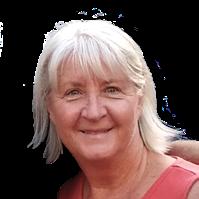
“I’ve always been . . . happy to be studying theology,” Kathy says. “I had nothing but the highest respect and esteem for my professors.”
Kathy says those professors always encouraged her theological study—“even though I was a girl.”
For 25 years, Kathy served as the director of library services and taught literature and education courses. She’s been volunteering with Grace Gospel Fellowship and the Association for Biblical Higher Education for over 30 years.
Anna Lange ’16 teaches English at Saraland High School in Mobile, Alabama, but her mission, mentoring students, goes beyond grammar.
Anna received the T. R. Houston Christian Service Award before graduating from Grace with a BRE, and a BS in Secondary Education from Cornerstone University in 2016. She earned an MA in Professional Writing from Liberty University in 2019. In 2021, Anna was recognized as the Saraland High School Teacher of the Year and Saraland City Schools District Teacher of the Year.

Kizombo Kalumbula
Kizombo Kalumbula ’94 traveled from the Democratic Republic of Congo only to visit his parents, who were students at Grace. But he stayed and graduated with a BRE from Grace and a BBA from Davenport University.
After earning advanced degrees in counseling and health psychology, Kizombo became a Grace adjunct professor. He leads International Berean Ministries, which his parents established, and pastors at Tabernacle Community Church in Grand Rapids—a church he and his wife, Carrie, started in 2002.
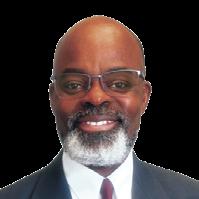
“I feel blessed to be able to participate in the formation of other peoples’ lives,” Kizombo says. “And impacting the world for greater glory—the glory of Jesus.”
Carrie Kalumbula
“People are all in need of grace and are all at different levels of their spiritual development,” says Carrie (DeZwaan) Kalumbula ’99, who has worked with students of all ages since graduating with a BRE from Grace and a BS in Education from Cornerstone University in 1999.
Carrie played basketball—landed in the Grace Tigers Hall of Fame— and became the assistant coach.
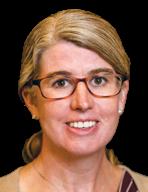
In 1997, Carrie and Kizombo married, and in 2001, she became the Grace women’s resident director. At church, Carrie coordinated children’s ministries. She homeschools their six children and two nephews.
“We hope and pray [our children] will grow up to be godly individuals who also are prepared to serve God,” Carrie says.
Born in Africa to missionaries, Abby Pickett planned to return there after high school. But when her father began teaching at Milwaukee Bible College, plans changed. Abby attended for three years and finished her degree at the University of Dubuque in 1962. “I enjoyed the friendships of other Christian boys and girls, ladies and gentlemen, that I had not had on the mission field,” Abby says. “Socially it was good, of course, spiritually it was excellent.”
Abby taught in Grandville, Michigan until 2002. She earned two master’s degrees from Western Michigan University and faithfully served in Grace Gospel Fellowship churches.

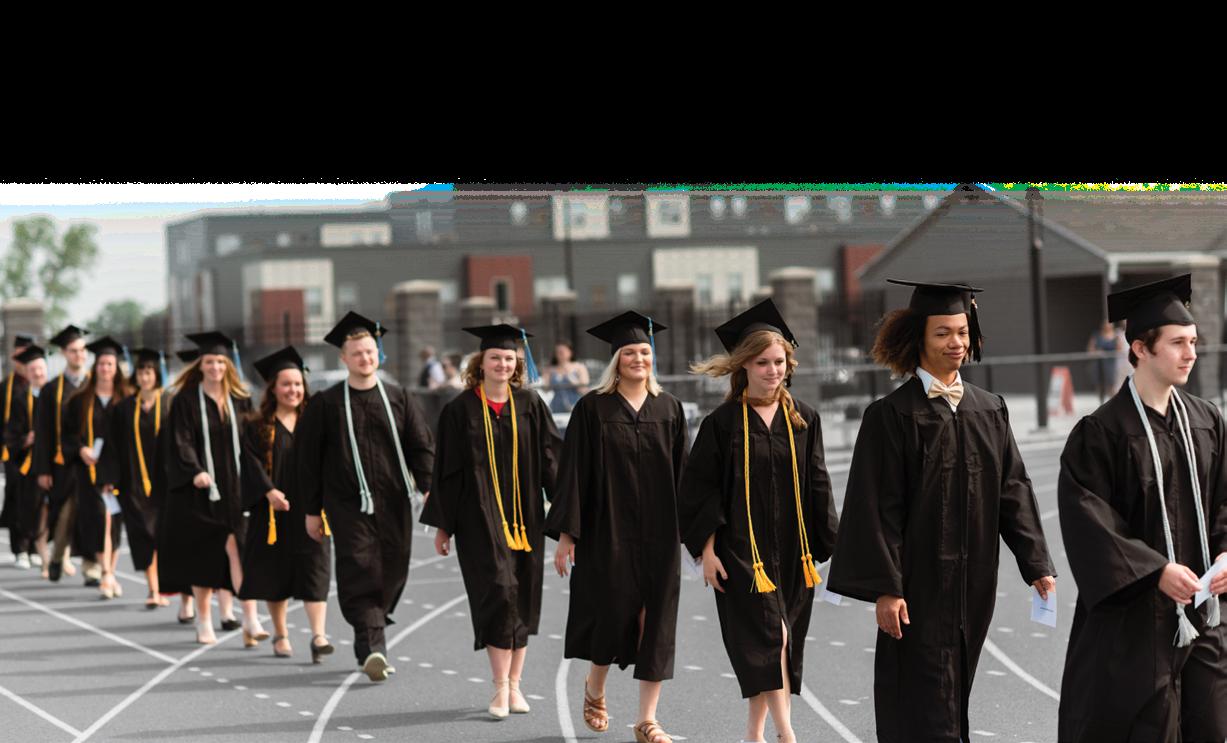
It’s time to celebrate! Read more from our 2021 Alumni Award winners, see photos of commencement, and cheer for the students who made the Dean’s List! Scan this QR code to read and share all these stories online.

